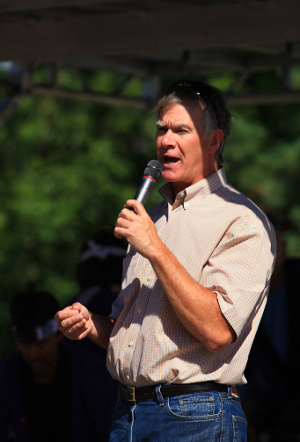 Speaking outdoors is one of the most difficult challenges faced by a public speaker. Speaking outdoors is one of the most difficult challenges faced by a public speaker.
Do you know how to overcome the obstacles in this difficult scenario?
An anonymous Six Minutes reader asks:
Every speech I’ve heard given outdoors has been pretty much a disaster. Have I just been unlucky, or is this an impossible venue? Is there any way to succeed?
In this article, we’ll examine the unique challenges of speaking outdoors, and give several tips for effectively getting your message across.
The Challenges of Speaking Outdoors
While it’s great to be outside in the fresh air, it’s usually a terrible venue for speaking. Yet, as long as people continue to congregate outside, there will be speeches delivered outside. Just a few examples include:
- Addressing co-workers at a summer event.
- Delivering a toast at an outdoor wedding or beach barbecue.
- Giving a pep talk to a sports team.
- Speaking to supporters at an outdoor political rally.
- Commemorating an event or speaking at a ribbon-cutting ceremony.
The benefits of speaking outdoors are… ah, yes, of course…
- The lighting is usually very good.
That’s the only one I can think of. Seriously.
On the other hand, the drawbacks of speaking outdoors include:
- Visual distractions abound, including people walking by, animals, scenery, and even the sky! All of these are competing for the visual attention of your audience. Consider that when you speak indoors, your audience has a relatively narrow choice of things to look at (you, your slides, their mobile device, or the walls)
- Sound quality is poor as well. Not only do you have to compete with outdoor sounds of all variety (e.g. barking dogs; motored vehicles; sirens; airplanes; even a whistling wind), but your voice may not carry as well either because you are usually standing much farther away from your audience than you would be indoors.
- As a whole, outdoor events tend to be less structured than those indoors. Getting and retaining their attention can be a difficult or futile activity.
8 Tips for Successfully Speaking Outdoors
Despite all the challenges, there are many things that you can do to improve your effectiveness the next time you speak outdoors.
- Get attention. If the speech is not part of a planned agenda, it can be difficult even getting the group to look in your direction, much less listen to a speech. How do you get attention? A booming voice, helpful assistants, or a noisy instrument helps.
- Gather people as close as you can. Outdoor events tend to be fairly relaxed (that’s why you are outdoors!), and people are spread out much more than they would be at a comparable event indoors. By gathering people closer, you improve sight lines, make it easier for everyone to hear you, and increase audience connection. It is well worth your effort to ask people to move in closer. (Not everyone will, but some will, and that’s an improvement.)
- Move up higher. If there’s a podium to speak from, great. But there usually isn’t. To help everyone see you (and your gestures) better, figure out some way to get higher. Sometimes the landscape will provide for you (e.g. a raised mound; a big rock). Other times, you have to get more creative (e.g. a chair; a milk crate; a picnic table; a tree stump). But please, be careful of your footing.
- Speak loudly. If you have a timid voice, you are going to have a very difficult time in this environment. Speaking loud is often necessary for you to to be heard at all, and will help you to keep your audience’s attention when distracting sounds invade.
- Arrange for audio help, if possible. Megaphones and microphones can be tricky to use, but if they are available, I encourage you to use them. If your audience has to strain too hard to hear you, they may give up and watch the clouds instead.
- Use broad gestures. There are so many moving distractions outside that you’ll often need to be particularly expressive to compete with them.
- Position yourself so the sun is not in your audience’s eyes. Looking into the sun is too much to ask for most audiences. Position yourself so the sun is off to the side or, if necessary, in your eyes. Hope for clouds (but not rain).
- Keep your remarks brief. You have a captive audience in a lecture theater, but outdoors, most people want to get back to relaxing, talking, or joining the burger line-up. If you respect this, your audience will thank you.
Good luck!
Your Turn: What’s Your Opinion?
Have you had success speaking outdoors? Or been in the audience for a particularly good speech? What was the key to success?
|
 Speaking outdoors is one of the most difficult challenges faced by a public speaker.
Speaking outdoors is one of the most difficult challenges faced by a public speaker.